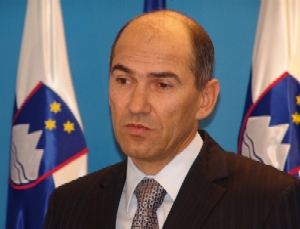At a press conference before the ceremony celebrating the 50th anniversary of the Treaty of Rome in Berlin, the Prime Minister of the Republic of Slovenia, Janez Janša, stressed that half a century later, it can be said with a fair degree of consensus that the European Union is a success story. The EU has provided the whole continent with peace, stability and great overall development. "The European Union enabled the re-democratisation of the Eastern part of the continent and in 2004 the great integration," said the PM.

(Photo: Office of the Prime Minister)
According to Mr Janša, the Berlin Declaration, which will be signed on the occasion, will summarise the key achievements of the EU, the common ideals and values on which it is based, and the principle internal and external challenges it faces. The document, which will not be legally binding, but will be of symbolic significance, will also mention the need to place the EU on a renewed common basis. "This commitment, which probably will not mention the Treaty Establishing a Constitution for Europe, refers to the situation which emerged following the failure of the Treaty to be ratified in two countries," said the Slovenian PM. According to the PM, the commitment that the EU will strive to renew its common grounds before the next European parliamentary elections in 2009 is the key message of the declaration. "Agreeing on the need to place the EU on a renewed common basis is the first major positive step after the crisis of the EU's institutional reform," he said.
When the declaration was being written, there were some problems mentioned to which Slovenia strived to include solutions. The dilemmas were handled and the enlargement of the EU and the establishment of the European Monetary Union will be mentioned as major successes. "It is very significant that the declaration mentions balanced development, in terms of a balance between competitiveness and solidarity," said the PM, adding that the fact that the document responds to the challenges of the protection of the environment and renewable sources of energy was also positive.
Like other members of the EU, Slovenia expects the German presidency to complete the work which officially begins with the signing of the Berlin Declaration before the June meeting of the European Council, and to prepare a resolution to the institutional crisis of the EU. "We have the ambition to confirm the timeline of all the necessary steps in June to facilitate the timely renewal of the common basis, which can be considered at the 2009 elections to the European Parliament," said the PM. Slovenia expects the necessary solutions to be reached by the end of this year. According to the PM, it is very likely that the procedure will continue into Slovenia's presidency, which will present an additional challenge for Slovenia.
"With a view to the first-hand experience with the German presidency of the EU, I can say we are moderately optimistic," the PM said of the work of Germany, stressing the relations between the EU and the USA on one side and Russia on the other, where some issues, previously the cause of dilemmas, have been addressed productively, and the recent German position on the US bulding missile defence shields in some EU countries. "This is a very productive view, which demonstrates the strong commitment of the German presidency to dealing with real dilemmas," said Mr Janša, adding that Slovenia is very satisfied with the cooperation with Germany with regard to the presidency within the joint programme framework of Slovenia, Portugal and Germany.
The Slovenian PM also emphasised that with regard to solving various world crises, Slovenia shapes and coordinated its foreign policy within the EU. He explained that the recent unilateral moves of some Slovenian politicians with regard to the Iranian nuclear programme and international control over it do not represent the position of the Republic of Slovenia, nor were they coorinated with it and are unknown to the government. "Slovenia will remain commited to the decisions which have been corrdinated and adopted within the EU. With regard to the concrete issue of EU–Iran relations, this view was also made very clear during the visit of the Iranian foreign minister to Slovenia. The EU has a very principled and balanced view on this, and strives for a peaceful solution and for eliminating security risks which could threaten the security of the EU." The same holds true with regard to the future status of Kosovo, where Slovenia coordinates its position within the EU, which in the future will assume complete responsibility for peace and stability in the region. "Here, the positions and measures must be fully coordinated within the EU, or we will end up damaging ourselves," concluded the PM.